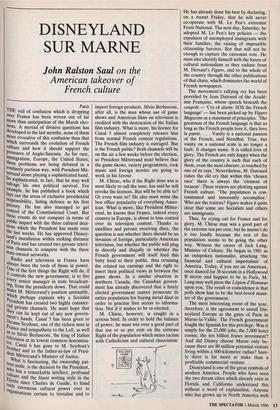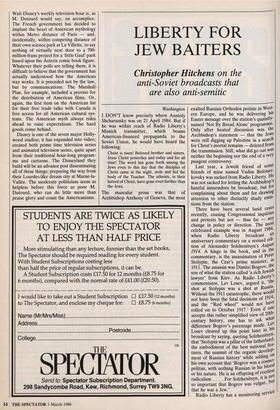DISNEYLAND SUR MARNE
John Ralston Saul on the
American takeover of French culture
Paris THE veil of confusion which is dropping Over France has been woven out of far more than anticipation of the March elec- tions. A myriad of divisive questions has developed in the last months, none of them more evocative of this confusion than that which surrounds the evolution of French Culture and how it should support the pressures of Anglo-Saxonia. As for race, immigration, Europe, the United States; these problems are being debated in a routinely partisan way, with President Mit- terrand alone playing a sophisticated hand. S° sophisticated, in fact, that he may well salvage his own political survival. For example, he has published a book which lays out the areas of exclusive presidential responsibility, listing defence as his first Priority. He has also managed to get Control of the Constitutional Court. But these events do not compare in terms of public impact with the three cultural deci- sions which the President has made over the last weeks. He has approved Disney- land's installation within striking distance °f Paris and has created two private televi- sion channels to compete with the three state-owned networks.
Radio and television in France have always been the tools of those in power. 9ne of the first things the Right will do, if it Controls the new government, is to fire eves, senior manager in state broadcast- ing, from the presidents down. That could Make M. Mitterrand's position untenable, !Inch perhaps explains why a Socialist President has created two highly commer- elal private channels. He must hope that they can be kept out of any new govern- ment's hands. Canal 5 has been given to Jerome Seydoux, one of the richest men in France and sympathetic to the Left, as well as to Silvio Berlusconi, the king of Italian _television at its lowest common denomina- tor. Canal 6 has gone to M. Seydoux's brother and to the father-in-law of Presi- dent Mitterrand's Minister of Justice. , What is fascinating, the ownership pat- tern aside, is the decision by the President, Who has a remarkable intellect, profound culture and the finest writing style in the tlYsee since Charles de Gaulle, to hand such enormous cultural power over to urganisations certain to trivialise and to import foreign products. Silvio Berlusconi, after all, is the man whose use of game shows and American films on television is credited with the destruction of the Italian film industry. What is more, his licence for Canal 5 almost completely releases him from normal French content regulations. The French film industry is outraged. But is the French public? Both channels will be on the air a few weeks before the election, so President Mitterrand must believe that the game shows, variety programmes, rock music and foreign movies are going to work in his favour.
M. Chirac, who if the Right does win is most likely to call the tune, has said he will revoke the licences. But will he be able to? Or even want to? He also must sense the box office popularity of everything Amer- ican. What is more, like President Mitter- rand, he knows that France, indeed every country in Europe, is about to lose control over its television content. Thanks to satellites and private receiving discs, the question is not whether there should be an invasion of foreign, particularly American television, but whether the public will plug in directly and illegally or whether the French government will itself feed this baby food to their public, thus retaining the related tax earnings and the right to insert their political views in between the game shows. In a similar situation in northern Canada, the Canadian govern- ment has already discovered that a freely elected government cannot prosecute its entire population for buying metal discs in order to practise free access to informa- tion. Not if it wishes to be re-elected.
M. Chirac, however, is caught in a serious bind. In order to hold the balance of power, he must win over a good part of that ten or so per cent on the extreme Right of the population which mixes racism with Catholicism and cultural chauvinism. He has already done his best by declaring, on a recent Friday, that he will never co-operate with M. Le Pen's extremist Front National. The next day, Saturday, he adopted M. Le Pen's key policies — the expulsion of unemployed immigrants with their families; the raising of impossible citizenship barriers. But that will not be enough to capture the extremist vote. He must also identify himself with the forces of cultural nationalism as they radiate from M. Hersant's Figaro, and to the whole of the country through the other publications of that chain, which dominates the world of French newspapers.
The movement's rallying cry has been provided by Jean Dutourd of the Acade- mie Francaise, whose speech beneath the coupole — 'Cry of alarm: SOS the French language' — has been picked up by Figaro Magazine as a statement of principles. 'The greatness of the French language is that so long as the French people love it, they love la patrie. . . . Vanity is a national passion of the French, said Stendhal. True, but vanity on a national scale is no longer a fault. It changes name. It is called love of glory. The French are only happy when the glory of the country is such that each of them, even the most obscure, is touched by one of its rays.' Nevertheless, M. Dutourd raises the old cry that within this 'chosen race' there is always the 'element of treason'. These traitors are plotting against French culture. 'The population is con- taminated and innocently accomplice.' Who are the traitors? Figaro makes it quite clear that some are Socialists and others are immigrants.
Thus, by crying out for France and for glory, M. Chirac may win a good part of the extreme ten per cent, but he mustn't do it too loudly because the rest of the population seems to be going the other way. Witness the career of Jack Lang, Minister of Culture. He began in 1981 as an outspoken nationalist, attacking 'the financial and cultural imperialism' of America. Today, if you are an American, once danced for 30 seconds in a Hollywood B movie and happen to be in Paris, M. Lang may well press the Legion d'Honneur upon you. The result or coincidence is that polls show him to be the best-loved minis- ter of the government.
The most interesting event of the year, therefore, is the agreement to install Dis- neyland Europe at the gates of Paris in Marne-la-Vallee. The French government fought the Spanish for this privilege. Was it simply for the 23,000 jobs; the 5,000 hotel rooms; the ten billion francs investment? And did Disney choose Marne only be- cause there are 80 million potential visitors living within a 600-kilometre radius? Sure- ly there is far more at stake than a profitable commercial venture.
Disneyland is one of the great symbols of modern America. People who have seen the two dream cities which already exist in Florida and California understand this without a word of explanation. Anyone who has grown up in North America with Walt Disney's weekly television hour is, as M. Dutourd would say, an accomplice. The French government has decided to implant the heart of American mythology within Metro distance of Paris — and, incidentally, within competing distance of their own science park at La Villette, to say nothing of virtually next door to a 700- million-franc project for a `little Gaul' park based upon the Asterix comic book figure. Whatever their polls are telling them, it is difficult to believe that the government has actually understood how the American way works. It is preceded not by the law, but by communications. The Marshall Plan, for example, included a proviso for the distribution of American films. Or, again, the first item on the American list for their free trade talks with Canada is free access for all American cultural sys- tems. The American myth always rides ahead to raise expectations. The hard goods come behind.
Disney is one of the seven major Holly- wood studios; it has expanded into video; created both prime time television series and animated television series, quite apart from their traditional hour-long program- me and cartoons. The Disneyland they build will be an advance post disseminating all of these things; preparing the way from their Lourdes-like dream city at Marne-la- Vallee. The moderate politicians seem as helpless before this force as poor M. Dutourd, who can do little more than praise glory and count the Americanisms.















































 Previous page
Previous page